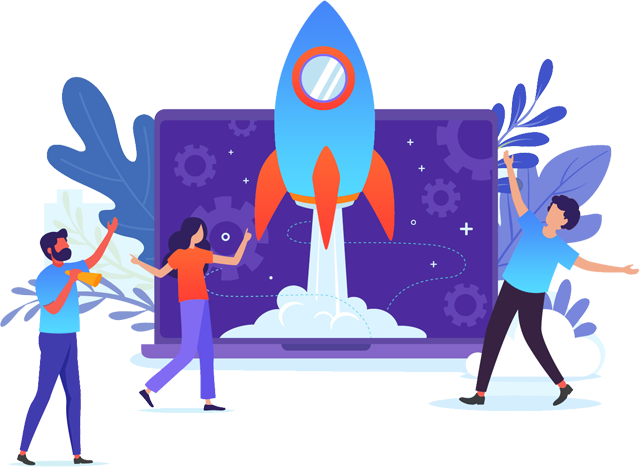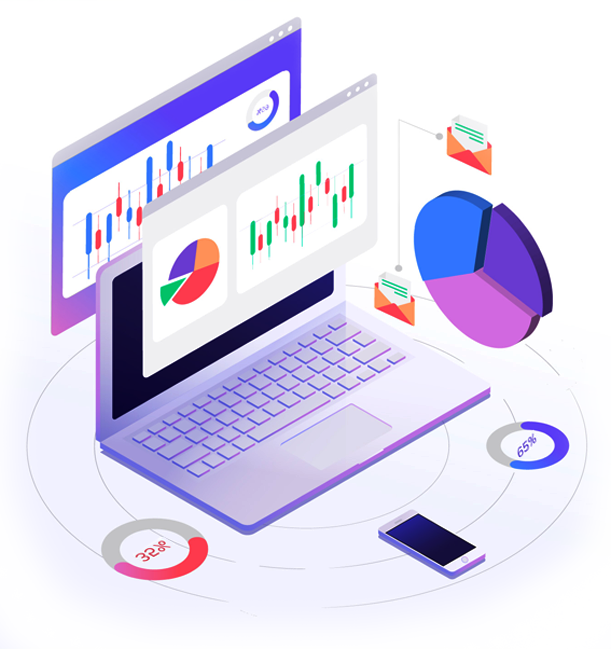Empowering Your Business with DevOps and SRE Services
Introducing DevOps and SRE services to your business can be a game-changer, offering a multitude of benefits and advantages over traditional approaches to software development and infrastructure management.


DevOps Methodology
DevOps focuses on the integration of software development and IT operations, creating a culture of collaboration and automation to deliver high-quality software faster and with greater efficiency.

Site Reliability Engineering (SRE)
On the other hand, SRE is all about ensuring the reliability and availability of systems and services, using data and automation to proactively identify and address potential issues before they become problems for your users.

The main difference their focus. DevOps is focused on collaboration between development and operations teams to deliver software quickly and reliably, while SRE is focused on ensuring the reliability and availability of production systems.
Featured Services
Seamless Software Delivery: Harnessing the Power of CI/CD
A game-changing approach to software development that has revolutionized the industry. With its focus on continuous integration and continuous deployment, CI/CD enables businesses to deliver software at a faster pace, with higher quality and reduced risk. By automating the entire software development lifecycle, CI/CD eliminates human error and increases collaboration, enabling businesses to stay ahead of the competition.
Continuous Integration (CI)
Automated Testing for Robust Code Quality
This includes all automated testing practices such as unit testing, integration testing, and functional testing. These tests are integrated into the CI pipeline to ensure that every code change is tested and verified for correctness.
Code Management with Source Control
This involves version control and source code management practices. It ensures that every code change is properly tracked and documented, making it easier to identify and fix issues.
Faster Iterations with Continuous Feedback
This involves continuous feedback loops throughout the CI process, allowing developers to quickly respond to any issues that arise. This can include feedback from automated tests, code reviews, and user acceptance testing.
Continuous Delivery and Deployment (CD)
Streamlining Deployments with Automation
This involves automating the deployment process to ensure consistency and reduce manual errors. This can include automated builds, configuration management, and containerization.
Efficient Release Management for Smooth CD
This involves managing the release process to ensure that the right changes are deployed at the right time. This can include feature toggling, release branching, and rollbacks.
Effortless Infrastructure Management with IaC
This involves using code to define infrastructure and configurations, allowing for consistent and repeatable deployments. This can include tools like Terraform and CloudFormation.
Featured Services
Building a Future-Ready DevOps Architecture: Principles, Components, Culture, and Benefits
A game-changing approach to software development that has revolutionized the industry. With its focus on continuous integration and continuous deployment, CI/CD enables businesses to deliver software at a faster pace, with higher quality and reduced risk. By automating the entire software development lifecycle, CI/CD eliminates human error and increases collaboration, enabling businesses to stay ahead of the competition.

Key Principles
The Foundations of DevOps: Key Principles for Success
This covers the fundamental principles of DevOps architecture, such as collaboration, automation, and continuous improvement. These principles are critical to the success of DevOps projects and help ensure that teams are aligned and focused on delivering value.
01
The key principle of DevOps architecture is the seamless collaboration and communication between development and operations teams.
02
DevOps architecture is heavily reliant on automation tools and technologies, which enable faster and more consistent software delivery.
03
DevOps architecture emphasizes the need for continuous improvement in all aspects of software development and delivery, including processes, tools, and workflows.

Components
Assembling Your DevOps: The Essential Components
This covers the core components, such as version control, testing frameworks, and deployment automation tools. These help teams to implement the principles of DevOps in a practical way and enable them to achieve greater efficiency, quality, and speed in software development.
01
Infrastructure as code (IaC) is a key component of DevOps architecture, allowing for the automation and consistency of infrastructure management.
02
Continuous integration and delivery (CI/CD) tools and pipelines are essential components of DevOps architecture, enabling fast and frequent software delivery.
03
Containerization and orchestration technologies such as Docker and Kubernetes are commonly used components of DevOps architecture, allowing for faster deployment and scaling of applications.

Culture
Culture Shock: How a DevOps Mindset Can Revolutionize
This covers the cultural aspects of DevOps architecture, such as communication, learning, and innovation. DevOps culture emphasizes collaboration, experimentation, and continuous learning, and it plays a vital role in fostering a supportive and productive environment.
01
A culture of collaboration and trust is a fundamental aspect of DevOps architecture, promoting cross-functional teams and a shared sense of ownership.
02
DevOps culture emphasizes the importance of continuous learning and improvement, with teams constantly seeking to optimize processes and workflows.
03
DevOps culture places a strong emphasis on delivering value to customers, with teams working to align software development with customer needs and requirements.

Benefits
The Business Value: Benefits and Achieving Success
This covers the benefits of DevOps architecture, such as faster time-to-market, improved quality, and greater efficiency. It enables teams to automate manual processes, reduce errors, and deliver software more frequently and reliably, resulting in significant business value.
01
Faster Time to Market: DevOps architecture enables faster delivery of software products and services, reducing time to market and providing a competitive edge.
02
DevOps architecture is designed with a focus on quality and consistency. DevOps practices result in the creation of more stable and reliable software, with fewer bugs and defects.
03
DevOps architecture promotes collaboration and communication between development and operations teams, resulting in a more seamless and efficient software delivery process.
Core Services

The Ultimate DevOps Stack: AWS, Azure, Commercial Tools, and Open Source
Welcome to the world of DevOps, where agility, efficiency, and innovation are the key to success. With the ever-growing demand for faster and more reliable software delivery, businesses are turning towards cloud-based solutions to achieve their goals. The Ultimate DevOps Stack combines the power of AWS and Azure, along with industry-leading commercial tools and open-source solutions to provide a seamless software delivery experience.

AWS DevOps
Looking for a powerful and efficient way to develop, deploy and manage your applications on AWS? Look no further than our AWS DevOps stack, featuring CodeBuild, CodeDeploy, CodeStar, CodePipeline, CloudFormation, and Elastic Beanstalk.

Azure DevOps
Boards, Pipelines, Repos, Test Plans, Artifacts, Terraform - streamline your development and delivery processes with powerful tools that enable collaboration, automation, testing, and version control. Accelerate your software delivery with Azure DevOps.
On Premises
Looking for a comprehensive set of tools to take your software development and operations to the next level? Look no further than our DevOps stack, featuring industry-leading solutions such as GitLab, Jenkins, Sonarqube, Ansible, Terraform, and Kubernetes.
Core Services
Power Up Your Infrastructure with IaC, Containerization, and Orchestration
Are you tired of managing your infrastructure manually? Do you want to simplify the deployment process and improve efficiency? Then it’s time to power up your infrastructure with IaC, containerization, and orchestration. By leveraging these powerful technologies, you can automate your infrastructure and improve scalability, reliability, and security. Say goodbye to manual processes and hello to a more streamlined, efficient, and powerful infrastructure. Discover how to transform your infrastructure today with IaC, containerization, and orchestration.
01
Infrastructure as Code
(IaC)
You can automate the provisioning and management of your IT infrastructure using software development techniques. This ensures that your infrastructure is scalable, reliable, and consistent across environments, all while reducing errors and increasing productivity.
02
Containerization and Microservices
You can break down your monolithic applications into smaller, more manageable components. This results in easier development, testing, deployment, and scaling of your applications, while also improving resource utilization and reducing costs.
03
Container Orchestration Platforms
You can automate the deployment, scaling, and management of containerized applications across clusters of machines. This allows for seamless application deployment and management, while also increasing scalability, fault tolerance, and resource utilization.

IT Service Management
Ensure smooth IT operations and provide top-notch customer service with IT service management solutions that can help you manage incidents, problems, changes, and service requests.

Cybersecurity and Compliance
Protect your data and infrastructure from cyber threats and ensure compliance with industry regulations and standards. Cybersecurity and compliance solutions can help you secure your networks, endpoints, and cloud environments.

Infrastructure Optimization
Optimize your IT infrastructure to achieve maximum performance, cost savings, and scalability. Infrastructure optimization solutions can help you manage and monitor your network, servers, storage, and applications.

Disaster Recovery and Business Continuity
Prepare for unexpected disruptions and minimize downtime with disaster recovery and business continuity solutions. These solutions can help you backup and recover your critical data and applications, and provide failover capabilities.
Featured Services
Business Continuity and IT Infrastructure Management Solutions
This set of IT services encompasses the critical components required to ensure the smooth functioning and security of an organization’s technology infrastructure.
IT service management focuses on ensuring that all IT services are delivered in a structured and efficient manner, while infrastructure optimization focuses on ensuring that the underlying technology is configured for optimal performance.
Cybersecurity and compliance measures aim to protect against external threats and ensure compliance with relevant regulations.
Disaster recovery and business continuity planning aim to minimize the impact of unforeseen events and ensure that business operations can be resumed as quickly as possible.
Together, these services help organizations to maintain the security, stability, and availability of their IT infrastructure.
Featured Services
SRE: Your Business with Advanced Observability and Analytics
These three areas are critical components of a modern IT infrastructure, enabling organizations to gain insights, identify issues, and optimize processes to drive business success.
By leveraging advanced monitoring, observability, and analytics tools, organizations can gain a deeper understanding of their systems and applications, identify issues more quickly, and make data-driven decisions to improve overall performance and reliability.
Monitoring and logging
Monitor and log all aspects of your IT infrastructure, from applications to servers and networks, to identify and troubleshoot issues quickly.
Monitoring and Observability
Gain real-time insights into your IT environment with monitoring and observability tools that provide deep visibility and detailed analysis of system performance and behavior.
Data Management and Analytics
Manage and analyze your data to gain valuable business insights and make informed decisions based on real-time data.
Pricing Plan
great price plan for you!
The perfect solution for those seeking affordable and high-quality service options.
Take a look at our service plans and choose the one that best fits your needs!

Basic Plan
Available for up to 40 hours of work each month, as needed.
USD $2500/Per Month
Collaborative team comprising of:
"Project Manager, Cloud Architect, DevOps Engineer, and (Linux, GitLab, Sonarqube, Ansible, Kubernetes, Terraform, and Jenkins) Engineer"

Professional Plan
Available for up to 80 hours of work each month, as needed.
USD $4800/Per Month
Collaborative team comprising of:
"Project Manager, Cloud Architect, DevOps Consultant, DevOps Engineer, (Linux, GitLab, Sonarqube, Selenium, Jmeter, Ansible, Docker Swarm, Kubernetes, Terraform, and Jenkins) Engineer, and Quality Assurance Engineer"

Advance Plan
Available for up to 160 hours of work each month, as needed.
USD $9400/Per Month
Collaborative team comprising of:
"Project Manager, Cloud Architect, DevOps Consultant, DevOps Engineer, Security Engineer, SRE (Site Reliability Engineer), (Linux, GitLab, Sonarqube, Selenium, Jmeter, Ansible, Docker Swarm, Kubernetes, Openshift, Terraform, Cloudformation, Jenkins, TeamCity, Zabbix, Prometheus, Grafana, Datadog, ELK Stack, Graylog, and Splunk) Engineer, and Quality Assurance Engineer"








